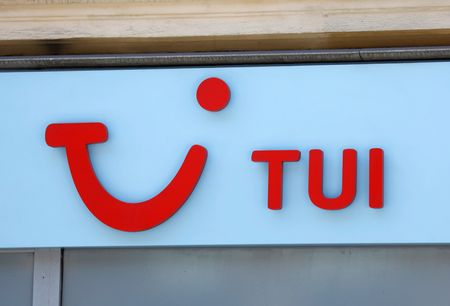By Joanna Plucinska
LONDON (Reuters) -Holiday group TUI said on Tuesday it was seeing encouraging booking trends for summer and next winter as customers return following a pandemic hiatus.
Some analysts have feared recessionary pressures could dampen demand for holidays, but results for airlines such as Ryanair, Wizz Air and easyJet have indicated consumers are gearing up for their holidays.
TUI, one of the world’s largest tour operators, said its number of guests in the first quarter was 3.3 million, compared with 2.3 million in fiscal 2022, while upcoming bookings for the 2023 winter and summer seasons hit 8.7 million.
London-listed shares of rose as much as 4.4% to 178.8p, snapping a three-session losing streak.
First-quarter revenue rose to 3.8 billion euros ($4 billion) from 2.4 billion euros the same time last year, while the group loss before interest and taxes halved to 158.7 million euros from 274 million a year earlier.
“Our strategy is clear: quality, cost discipline and market share. New products, additional customers, and as a result, more market share and above-average growth are the basis for future increases in revenue and earnings,” TUI Chief Executive Officer Sebastian Ebel said.
European consumers are grappling with the highest levels of inflation in a generation, but to-date demand for holidays has proved resilient.
Price increases in the tourism sector remain lower than inflationary cost hikes, allowing for continued optimism, Ebel said, adding the earthquake in Turkey had caused a slight slowdown in bookings to that country.
Separately, TUI shareholders are expected to vote on a capital increase plan later on Tuesday to repay Germany’s Economic Stablisation Fund, set to take place by the end of the year. The fund helped to rescue TUI during the pandemic.
“The actual capital raise, we will do that at the right time in the right capital market window,” Chief Financial Officer Mathias Kiep said.
($1 = 0.9317 euros)
(Additional reporting by Miranda Murray and Ilona Wissenbach; Editing by Shounak Dasgupta and Mark Potter)

